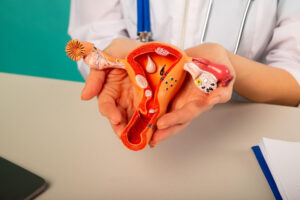Polycystic Ovary Syndrome (PCOS) affects millions of women worldwide, often becoming a major roadblock in their journey to motherhood. One of the most frequently asked questions is: What is the best age to get pregnant with PCOS? The answer isn’t one-size-fits-all—but understanding the connection between age, hormones, and fertility can help women with PCOS make empowered decisions.
Understanding PCOS and Fertility
Polycystic Ovary Syndrome (PCOS) is a hormonal imbalance that disrupts ovulation. Women with PCOS often experience irregular periods, excess androgen levels, and polycystic ovaries. These factors collectively impair fertility, making it harder to conceive naturally.
PCOS doesn’t mean infertility—it means reduced fertility. Many women with PCOS can and do get pregnant with lifestyle changes, medical interventions, or naturally—especially if they plan it around their optimal fertility window.
Best Age to Get Pregnant with PCOS
Generally, a woman’s fertility starts to decline after the age of 30, and more steeply after 35. For women with PCOS, this timeline matters even more because of the additional hormonal challenges.
Experts suggest the best age to get pregnant with PCOS is between 25 and 32 years, when egg quality is still strong, and hormone levels are relatively manageable.
This doesn’t mean it’s impossible to conceive later—but it may require more medical support such as ovulation induction or IVF.
PCOS Pregnancy Success Rate by Age
| Age Range | Natural Pregnancy Chance (with PCOS) | Notes |
| 20–24 | High | Hormonal imbalance is manageable; good egg quality |
| 25–29 | Very High | Peak fertility; ideal time for planning conception |
| 30–34 | Moderate | Good chance with or without help |
| 35–39 | Low to Moderate | May require ovulation induction or IVF |
| 40+ | Low | Higher risks, lower egg quality, often IVF required |
Note: These are general figures; success depends on individual health, lifestyle, and treatment plans.
Age-Related Fertility Challenges with PCOS
Even without PCOS, age reduces both the quality and quantity of eggs. For women with PCOS, the challenge is doubled due to irregular ovulation and hormonal imbalance.
Key age-related risks:
- Lower egg quality after 35
- Increased chances of gestational diabetes and preeclampsia
- Longer time to conceive
- Higher miscarriage rates
Hence, planning pregnancy earlier (ideally before 35) is recommended for PCOS women looking to conceive naturally or with minimal assistance.

Getting Pregnant with PCOS Naturally
While fertility treatments are available, many women can still conceive naturally with PCOS—especially at a younger age.
Tips to improve natural fertility with PCOS:
- Maintain a healthy weight
- Follow a low-GI or anti-inflammatory diet
- Exercise regularly
- Manage stress levels
- Track ovulation using BBT or ovulation predictor kits
- Avoid smoking and limit alcohol
These lifestyle changes can regulate ovulation, enhance egg quality, and improve your overall reproductive health.
Fertility Treatment Options for PCOS
If natural methods don’t work, several fertility treatments are available:
- Ovulation Induction: Using medications like Clomid or Letrozole
- Intrauterine Insemination (IUI): Assists sperm to reach the egg
- In Vitro Fertilization (IVF): High success rate but expensive
- Ovarian Drilling (rare): A laparoscopic procedure to stimulate ovulation
Your doctor will evaluate your hormonal profile, age, and ovarian reserve before recommending a treatment plan.
Egg Quality and PCOS
PCOS itself doesn’t affect egg quality, but delayed pregnancy can. The older you get, the more your egg quality declines. That’s why younger women with PCOS have better IVF success rates and a higher chance of natural conception.
PCOS and Delayed Pregnancy Risks
Delaying pregnancy beyond 35, especially with PCOS, can increase risks like:
- Poor response to fertility treatments
- Increased risk of gestational diabetes
- Higher chance of miscarriage
- Greater likelihood of needing C-section
That said, with proper prenatal care and medical support, many women have healthy pregnancies in their late 30s and even early 40s.

Early Pregnancy Tips for PCOS Women
If you’re trying to conceive and have PCOS, here are some helpful tips:
- Start early: Even if you don’t plan to conceive now, track your cycles and assess your fertility health
- Consult a fertility specialist by your early 30s if you haven’t conceived
- Use supplements like Myo-inositol and folic acid
- Monitor ovulation closely
- Stay consistent with diet and exercise to reduce insulin resistance
When to See a Doctor
If you’re under 35 and haven’t conceived in 12 months—or over 35 and trying for 6 months—consult a fertility expert. Early intervention improves success.
Final Thoughts
The best age to get pregnant with PCOS is ideally between 25 to 32 years, when fertility is relatively high and hormonal symptoms are more manageable. However, with the right medical guidance, lifestyle choices, and patience, women with PCOS can conceive at various stages of life.
Every woman’s journey is unique—understand your body, plan ahead, and don’t hesitate to seek help. PCOS may make the journey more complex, but it’s far from impossible. Need expert fertility support in Hyderabad? Visit Boon IVF, your trusted partner for PCOS and fertility treatments. Our specialists are here to guide you every step of the way


